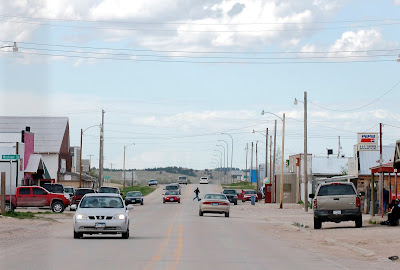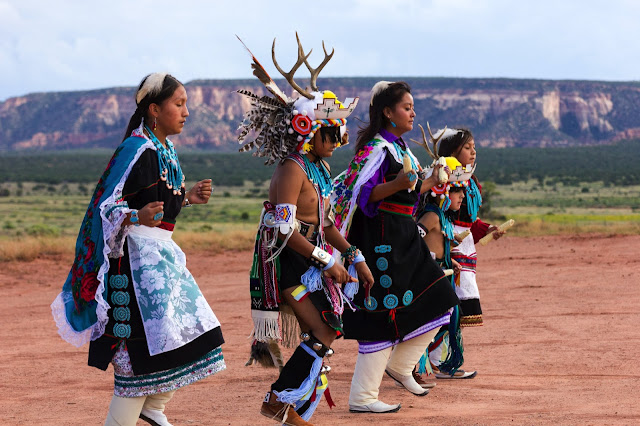OST Takes Aim at Newspaper, Attorney
This article and a followup appeared on Indian Country Today Media Network in 2015. For more on topics like this, see my book, American Apartheid: The Native American Struggle....
The Oglala
Sioux Tribal Council has approved a resolution requesting that Pine Ridge
Indian Reservation businesses halt sales of the Rapid City Journal.
The action
was in response to the newspaper’s January 31 front-page headline, “Did Native
students stand for National Anthem?” The article elaborated on a disputed
anonymous claim that Pine Ridge schoolchildren who were taunted and sprayed
with beer at a Rapid City Rush hockey game had not stood for The
Star-Spangled Banner.
The
article and its headline caused lasting outrage. The Native American
Journalists Association called the story “troubling”
and “irresponsible.” Native News Online called it “blaming the victims.”
At a public forum, Rapid City Mayor Sam Kooiker held the newspaper upside down
and described it as “an example of institutional racism,” wrote David Rooks in ICTMN.
 The
Associated Press article on the council’s
February 24 resolution — and the newspapers, TV and radio stations and blogs
that picked it up — described the action as a “ban.” As word spread, so did
accusations that the council had trampled on freedom of the press and the First
Amendment.
The
Associated Press article on the council’s
February 24 resolution — and the newspapers, TV and radio stations and blogs
that picked it up — described the action as a “ban.” As word spread, so did
accusations that the council had trampled on freedom of the press and the First
Amendment.
Not so,
said leading Indian-law expert Carole E. Goldberg, professor of law and vice
chancellor at UCLA. “I have read the resolution carefully. It does not bar
sales of the newspaper. It merely supports a ‘request’ by an entity of the
Tribe that reservation businesses not sell the paper.” The mainstream press has
a tendency to sensationalize Indian-country stories, and that may have been
what happened here, Goldberg added.
“With the
resolution, the tribal council was making a point,” said James Mitchell, a
manager at Big Bat’s store and gas station, in downtown Pine Ridge. “The Journal
published something they shouldn’t have, and the council made an example of
them.”
Big Bat’s
is not selling the paper, Mitchell said: “This is a sovereign nation, and
stores here are complying with the request.” Calls to other reservation stores
with newsstands found similar policies. Both Mitchell and Lisa Spotted Horse, a
cashier at Pinky’s, in Manderson, said customers were divided between those who
supported the resolution, those who didn’t, others who didn’t care, and yet
others who said they could pick up the paper off-reservation. Mitchell noted
that Pine Ridge village residents could find a copy in Whiteclay, Nebraska,
just over the state line (shown above); in South Dakota, Martin and Interior are nearby
options.
The Rapid
City Journal has long been described as racist and divisive on South Dakota
reservations and increasingly throughout the state. Oglala tribal member and
former tribal attorney Brett Lee Shelton said he sympathized with the decades
of irritation that lay behind the council’s action.
“In my
experience, the Rapid City Journal seems to set aside any consideration
of journalistic ethics or the impact of its approach when it reports on Pine
Ridge,” Shelton said. “A few years ago, I finally blew up at one of the
editorial staff, told them exactly what I thought and have since refused to
work with the paper.”
RCJ executive editor Bart Pfankuch has denied that the paper is
intentionally divisive, pointing out to NAJA that its coverage condemned what
happened to the children at the hockey game. He said in future the paper’s aim
will be to “try our hardest to bridge gaps and not deepen them.”
In the
portion of the February 24 resolution pertaining to attorney Patrick Duffy, the
council used unmistakably strong language. Because Duffy is representing the
man alleged to have harassed the children, the council “removed” him as a
tribal contractor, “banned” him from doing business on the reservation and “revoked”
his tribal-court privileges. The resolution also linked Duffy to the Rapid
City Journal, where it claimed he is a writer. (He is not, said the
newspaper’s HR department, though his son, sportswriter Padraic Duffy, is on
staff there.)
Tribal
Vice President Tom Poor Bear criticized the council’s position on Duffy,
according to Native Sun News,
which quoted Poor Bear saying at a recent public meeting, “Every one accused of
a crime has the right to a lawyer, and an attorney cannot be held responsible
for the alleged crimes of his client.”
True, said
Shelton, but noted that the tribe nevertheless retains the right to regulate
business, and whom it allows to conduct business, within its borders.
Goldberg
said she’d be surprised if the Oglala constitution and laws didn’t allow a
tribal-court challenge to this portion of the resolution.
The tribe’s
spokesperson, Kevin Steele, created additional uncertainty when he told the AP
last week that the ban will be in effect until RCJ prints an apology (it
did so on February 2). Steele did not respond to ICTMN’s requests for comments on the
resolution as a whole or the apparent mix-ups.
Text c. Stephanie Woodard; photographs c. Joseph Zummo.
Text c. Stephanie Woodard; photographs c. Joseph Zummo.


